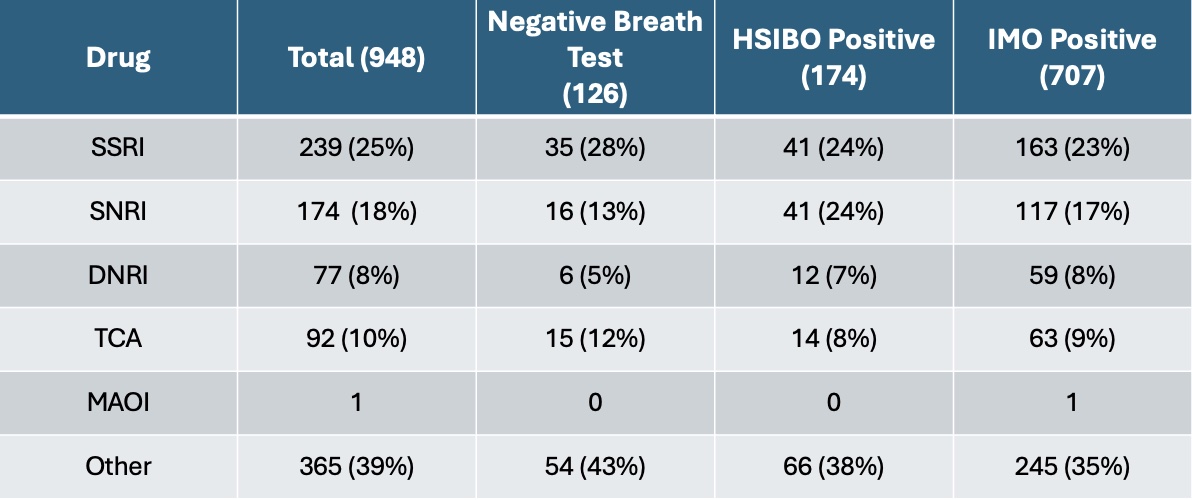Monday Poster Session
Category: Functional Bowel Disease
P2931 - Mind-Gut Connection: Evaluating the Relationship Between the Use of Psychiatric Medications in Those Undergoing SIBO Testing
Monday, October 27, 2025
10:30 AM - 4:00 PM PDT
Location: Exhibit Hall

Mary Kate Sullivan, MD (she/her/hers)
University of Virginia Medical Center
Charlottesville, VA
Presenting Author(s)
Mary Kate Sullivan, MD1, Robert Cutler, MD2, Amy Doran, MD1, Jeanetta Frye, MD1, Mira Sridharan, MD3
1University of Virginia Medical Center, Charlottesville, VA; 2Atrium Health Wake Forest Baptist, Winston-Salem, NC; 3Boston Medical Center, Boston, MA
Introduction: Small intestinal bacterial overgrowth (SIBO) is the presence of excessive microbes in the small intestine and has been linked to psychiatric conditions like anxiety and depression. The relationship between mood disorders, their treatment with medications like SSRIs, SNRIs, DNRIs, TCAs, MAOIs and other drugs like GABA agonist, antipsychotics, and benzodiazepines and rates of SIBO are poorly understood. This study aims to identify an association between the use of psychiatric medications and those undergoing SIBO testing.
Methods: This is a retrospective case-control analysis identified 1,447 patients who underwent SIBO glucose breath testing between 2017 and 2023. All breath testing was completed with stringent pre-test preparation. We calculated the odds ratio (OR) by medication category for intestinal methanogen overgrown (IMO) and hydrogen SIBO (H-SIBO). We further evaluated the OR by comorbid obesity, type 2 diabetes, and gastric emptying study results. Chi square test was used to evaluate the significance of each combination.
Results: Of 1,447 individuals who underwent SIBO breath testing 990 (68%) were IMO positive, 249 (17%) were H-SIBO positive. Of patients undergoing breath testing, 948 (65%) were found to be taking a psychiatric medication and 881 (93%) of these had a positive breath test, 174 (20%) and 707 (80%) for H-SIBO and IMO respectively. SNRI usage was associated with H-SIBO (OR 1.58, p=0.018) positivity. Among patients with obesity, SNRI usage was similarly associated with higher rates of H-SIBO (OR 1.82, p=0.043). Among patients with obesity, use of TCAs was associated with lower rates of H-SIBO (OR 0.31, p=0.047). No association was found between rates of IMO and usage of any psychiatric medication.
Discussion: Our study found a significant relationship between H-SIBO and the use of SNRIs. Given the previously recognized association between psychiatric conditions and SIBO diagnosis, this association is not unexpected. However, since no association of increased SIBO incidence was noted among patients using SSRIs or DNRIs, this may represent a specific drug action. Additionally, the use of TCAs were associated with lower rates of SIBO diagnosis which given the utility of TCAs in functional abdominal conditions, could benefit this population and deserves further investigation. The correlations observed here are preliminary and must be further studied as we strive to understand the relationship between psychiatric conditions and medications and SIBO.

Figure: Use of psychiatric medications in those undergoing SIBO testing
Disclosures:
Mary Kate Sullivan indicated no relevant financial relationships.
Robert Cutler indicated no relevant financial relationships.
Amy Doran indicated no relevant financial relationships.
Jeanetta Frye indicated no relevant financial relationships.
Mira Sridharan indicated no relevant financial relationships.
Mary Kate Sullivan, MD1, Robert Cutler, MD2, Amy Doran, MD1, Jeanetta Frye, MD1, Mira Sridharan, MD3. P2931 - Mind-Gut Connection: Evaluating the Relationship Between the Use of Psychiatric Medications in Those Undergoing SIBO Testing, ACG 2025 Annual Scientific Meeting Abstracts. Phoenix, AZ: American College of Gastroenterology.
1University of Virginia Medical Center, Charlottesville, VA; 2Atrium Health Wake Forest Baptist, Winston-Salem, NC; 3Boston Medical Center, Boston, MA
Introduction: Small intestinal bacterial overgrowth (SIBO) is the presence of excessive microbes in the small intestine and has been linked to psychiatric conditions like anxiety and depression. The relationship between mood disorders, their treatment with medications like SSRIs, SNRIs, DNRIs, TCAs, MAOIs and other drugs like GABA agonist, antipsychotics, and benzodiazepines and rates of SIBO are poorly understood. This study aims to identify an association between the use of psychiatric medications and those undergoing SIBO testing.
Methods: This is a retrospective case-control analysis identified 1,447 patients who underwent SIBO glucose breath testing between 2017 and 2023. All breath testing was completed with stringent pre-test preparation. We calculated the odds ratio (OR) by medication category for intestinal methanogen overgrown (IMO) and hydrogen SIBO (H-SIBO). We further evaluated the OR by comorbid obesity, type 2 diabetes, and gastric emptying study results. Chi square test was used to evaluate the significance of each combination.
Results: Of 1,447 individuals who underwent SIBO breath testing 990 (68%) were IMO positive, 249 (17%) were H-SIBO positive. Of patients undergoing breath testing, 948 (65%) were found to be taking a psychiatric medication and 881 (93%) of these had a positive breath test, 174 (20%) and 707 (80%) for H-SIBO and IMO respectively. SNRI usage was associated with H-SIBO (OR 1.58, p=0.018) positivity. Among patients with obesity, SNRI usage was similarly associated with higher rates of H-SIBO (OR 1.82, p=0.043). Among patients with obesity, use of TCAs was associated with lower rates of H-SIBO (OR 0.31, p=0.047). No association was found between rates of IMO and usage of any psychiatric medication.
Discussion: Our study found a significant relationship between H-SIBO and the use of SNRIs. Given the previously recognized association between psychiatric conditions and SIBO diagnosis, this association is not unexpected. However, since no association of increased SIBO incidence was noted among patients using SSRIs or DNRIs, this may represent a specific drug action. Additionally, the use of TCAs were associated with lower rates of SIBO diagnosis which given the utility of TCAs in functional abdominal conditions, could benefit this population and deserves further investigation. The correlations observed here are preliminary and must be further studied as we strive to understand the relationship between psychiatric conditions and medications and SIBO.

Figure: Use of psychiatric medications in those undergoing SIBO testing
Disclosures:
Mary Kate Sullivan indicated no relevant financial relationships.
Robert Cutler indicated no relevant financial relationships.
Amy Doran indicated no relevant financial relationships.
Jeanetta Frye indicated no relevant financial relationships.
Mira Sridharan indicated no relevant financial relationships.
Mary Kate Sullivan, MD1, Robert Cutler, MD2, Amy Doran, MD1, Jeanetta Frye, MD1, Mira Sridharan, MD3. P2931 - Mind-Gut Connection: Evaluating the Relationship Between the Use of Psychiatric Medications in Those Undergoing SIBO Testing, ACG 2025 Annual Scientific Meeting Abstracts. Phoenix, AZ: American College of Gastroenterology.
